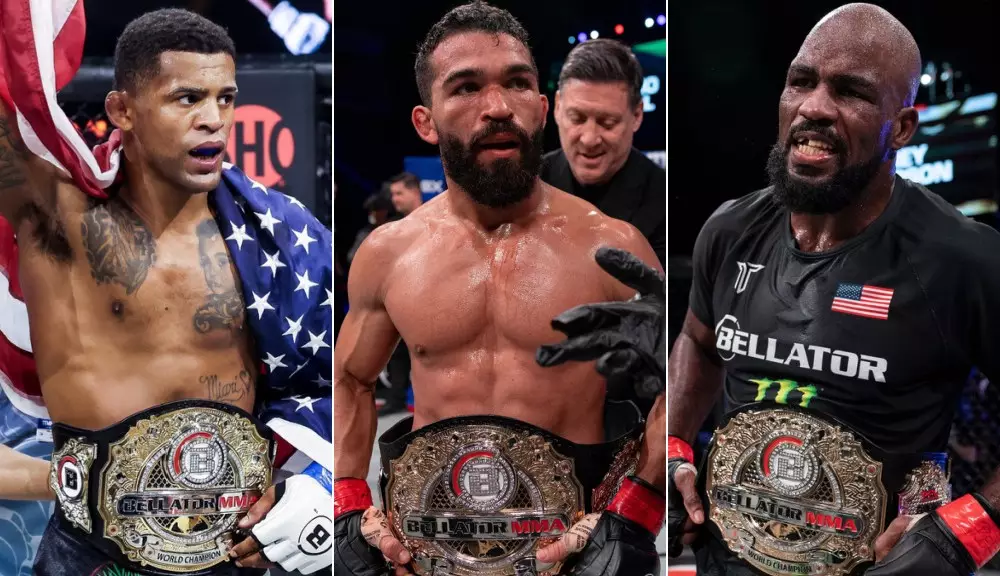In a sport where timing and communication are paramount, the Professional Fighters League (PFL) is facing a formidable storm of discontent from athletes since its acquisition of Bellator. Promising to prioritize fighters, the organization appears to have faltered, leaving several champions in limbo and questioning their futures. The current state of affairs raises significant concerns not just about the management but about the very essence of fighter welfare and engagement in decision-making processes.
A wave of dissatisfaction recently surfaced, spearheaded by fighters such as Patchy Mix, Corey Anderson, and Patricio Freire. These prominent athletes expressed their frustrations through social media, echoing a sentiment that many of their peers share: the lack of transparency and communication from PFL officials. Fighters who have dedicated their lives and careers to the sport now feel abandoned and anxious, their careers overshadowed by uncertainty and inaction.
Corey Anderson, the reigning light heavyweight champion, has publicly lamented the silence from the PFL regarding his title defense. After earning the championship title in March against Karl Moore, he has not had a fight scheduled, creating a palpable sense of urgency. With his social media posts oozing frustration, Anderson remarked on his feelings of stagnation: “Aging like warm cheese over here.” His discontent highlights a broader issue; champions who are either inactive or sidelined compromise the integrity of the sport.
Similarly, Patchy Mix echoed these sentiments after seeing his upcoming title defense canceled. With a professional record that positions him among the best, he articulated the feelings of many fighters caught in limbo, explaining his situation in a candid manner. After investing time and resources into rigorous training, the abrupt cancellation left him questioning his status: “I am the best in the world and I want to fight to prove it.” This desire for action, paired with the absence of communication, leaves many fighters teetering on the edge of frustration.
Patricio Freire, another seasoned competitor, also stepped into the fray, specifically criticizing the organization for its management of fight schedules. Freire detailed his missed opportunities for bouts throughout the year, underscoring a disturbing pattern of miscommunication that affects not just the champions but the entire roster. His plea for respect for the fighters’ lives and careers encapsulates the urgent demand for organizational accountability. As Freire pointedly observes, “This is not a game or just some business; these are people’s lives we are talking about.”
When PFL acquired Bellator in early 2024, there was hope for a transformative and positive path forward, particularly with the promise of multiple championship events throughout the year. However, only five Bellator events occurred this year, with a disappointing number of title fights. The apparent winding down of the Bellator brand raises serious concerns about the future of both the franchise and its fighters. Events that are primarily branded under PFL rather than Bellator diminish the legacy that many athletes have built throughout their careers.
Fighter grievances have increasingly spiraled into public discourse, as seen from other competitors like Leandro Higo and Cris Cyborg. Higo’s expression of frustration over uncertainty is emblematic of the broader sentiment within the fighter community, questioning the lack of clarity around fight schedules and expectations.
In addition to fighter frustrations, the silence from PFL executives only amplifies the tension brewing within the organization. High-profile former Bellator athletes, including Gegard Mousasi and Yaroslav Amosov, have also voiced their dissatisfaction, calling attention to the perceived negligence of PFL management. Moreover, MMA coaches like Duke Roufus have stepped into the conversation, bringing attention to the urgency of addressing fighters’ needs. Roufus eloquently emphasized that “time is of the essence,” stressing that fighters cannot waste their prime years mired in uncertainty.
This collective outcry from fighters, coaches, and the MMA community at large represents a clarion call for transparency and action from PFL. As athletes embark on their career arcs, they deserve clarity, support, and respect. The juxtaposition of quiet officials amidst a loud, rightfully frustrated fighter pool underscores a troubling disconnect that PFL needs to address.
For PFL to regain credibility and secure the loyalty of its fighters, significant changes must be made in terms of communication and organizational structure. Ensuring athletes are adequately informed about their fight schedules and contract situations is not just good practice; it is essential to fostering a healthy and respectful environment. This moment is pivotal for PFL and could define its legacy moving forward. In a sport where performance and opportunity directly correlate with career longevity and financial stability, the demands of the fighters should be a top priority for management.
The prevailing dissatisfaction suggests that PFL is at a crossroads, faced with the opportunity to either reinforce trust with its fighters or risk deepening the chasm of discord. Unless PFL acts swiftly and effectively, it may find itself grappling with a slow and painful decline, leaving behind a trail of disheartened athletes chasing the respect and opportunity they rightfully deserve.

